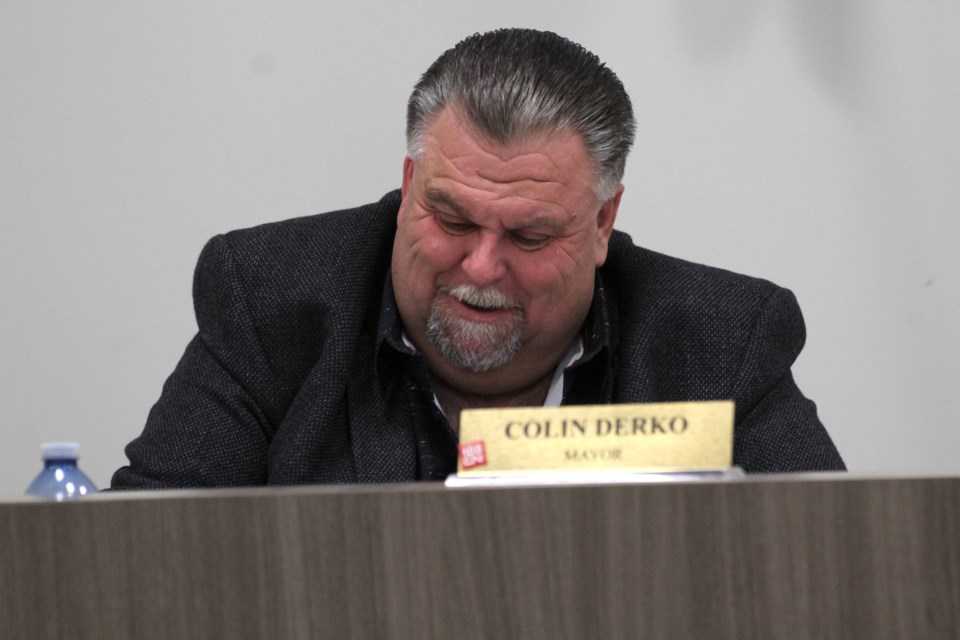A letter of intent sent to the village of Boyle by Red Wolf Corporation’s (RWC) CEO, Tom West detailed a multi-faceted series of capital investments committed to, “the principles of sustainability, community partnership, and economic revitalization.”
In total, $810 million will go into four projects — a transfer centre for commodities, which will make use of the rail system, a manufacturing facility for liquid H2 and battery-grade graphite, a sustainable agriculture company, and an independent power producer.
“We’ve always had opportunity, and we’ve always had good ideas come into our community,” said Coun. Barb Smith. “It’s just nice to see someone from outside our community recognize that … This is an amazing opportunity — they could’ve gone anywhere, and they chose us.”
The announcement comes after the announcement of the closure of the village's CIBC and Buy Low Foods.
Indigenous Led
Jerry Ladouceur is the majority owner of RWC — a development corporation with a particular focus on education and environmental stewardship — and he said the company’s primary focus is, and always will be, creating opportunities for Indigenous peoples.
“We promote Indigenous, we want Indigenous kids to be in school, that’s where we’re really trying to make an impact,” said Ladouceur. “It’s Indigenous first, we’re an Indigenous company and I don’t want to apologize to anybody for that.
“We also got to recognize, and we know that with this massive scale of projects, Indigenous people can’t fill (all) the jobs, so we target that second wave of hiring at locals.”
West said the corporation has its own set of ideals and principles that it is eager to prove to the community.
“We understand that we gotta prove ourselves,” said West. “(Our COO) is in Red Deer, I’m in Calgary, we’re new guys here and we gotta prove ourselves.”
Throughout the year-long discussion process, Derko said the Indigenous-based ideals, which include a code of values focused on safety and respect for the environment, remained the core focus for the corporation.
“Red Wolf came to us, and never once did they waver from the fact that they were an Indigenous-based company, with Indigenous-based ideals. They’re making sure they’re looking after an Indigenous community as far as jobs, education and sustainability go,” said Derko. “They’re huge on that, and they’ve never once changed their attitude on that — it’s also not wavered from the fact that it’s not just Indigenous, it’s about everybody.”
West said the company had originally hoped to break ground during Q1 in 2024 but is now expecting work to begin sometime between April and June.
“We’ll have something on the go, whether it’s bulldozers out there or we’re starting to construct the greenhouse, it’ll be something,” said West.
Range of professional opportunities
Often, municipalities end up competing for corporate investment; companies like Amazon will use the proposed jobs and tax revenue as a carrot to extract concessions from various locations. According to the village, the discussions never required breaking out that toolbox.
“Red Wolf has never asked, and we’ve never had to offer anything of the sort. It’s been respectful conversations about working together,” said Derko.
“When they came to us and said, ‘Here’s some of our challenges,’ we were able to say, ‘We can help you with those,’” added Smith. “I really feel the reason they’re supporting us, and are excited about our location, is that we are open to exploring options. It doesn’t have to be a dollar to be the focus.”
Red Wolf’s development is expected to bring in around 880 jobs over the next five years, including tradespeople to build and maintain the sites, and specialized operations staff for the H2 facility and transfer centre. The produce company, Mrs. G’s, is expected to generate over 200 jobs on its own, while also bolstering food security in the region through the company’s vertical farming and pod growing techniques.
West said each one of the jobs would belong to someone who lived in the region on a full-time basis and didn’t include the unknown amount of construction jobs the development process would require.
Smith, Derko, and village CAO Warren Griffin all agreed on one thing — the benefits of the project transcend the borders of Boyle. Whether it’s Buffalo Lake, Athabasca County, Caslan, or any other nearby community, the effects of a project of this size will spill over.
“When we’re looking at our geography, and where people are living, they’re going to be making sure that Indigenous people are getting some of these jobs, and are involved,” said Smith, referencing the community of Buffalo Lake. “The other discussion has been how do we keep youth in these areas? This is an opportunity for them to grow with the community, stay here, invest here, and have that progression and success in their jobs.”



